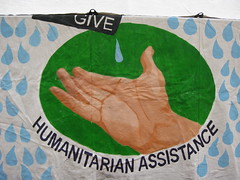 Sometimes I really wonder why we haven’t seen Madoff coming. Harvard Business School is one of the most high-profile business universities, and when a Harvard assistant professor of organisational behaviour talks about business ethics, you pay attention; so it should be no surprise that a recent interview with Michel Anteby, in which he seemed to support various sorts of fraudulent behaviour, drew quite some attention. His argument is that ‘leniencies’ are part of the standard managerial toolkit and that they are necessary to be able to our work well.
Sometimes I really wonder why we haven’t seen Madoff coming. Harvard Business School is one of the most high-profile business universities, and when a Harvard assistant professor of organisational behaviour talks about business ethics, you pay attention; so it should be no surprise that a recent interview with Michel Anteby, in which he seemed to support various sorts of fraudulent behaviour, drew quite some attention. His argument is that ‘leniencies’ are part of the standard managerial toolkit and that they are necessary to be able to our work well.
So let’s have a look at some of Anteby’s examples, try to find equivalents in health and aid logistics, and see how this works out.
Managing the store manager
[An] employee setting aside a clothing item in a storage room to later purchase for himself when the item will be deeply discounted is a gray zone as well. In high-end department stores such practices are often tolerated. This leniency when moderately exhibited is widely seen as “good” practice, a small favor done to reward deserving employees, and as such qualifies as a moral gray zone.
The equivalent here seems to be the store manager who ‘sets aside’ spare parts until the equipment for which they are used is superseded, and then buys them at a discount; or the medical store manager who ‘sets aside’ materials until they are almost expired in the knowledge that they will be donated to a befriended charity to prevent expiration. Is this acceptable? Not in my view — but the parallel with Anteby’s example is striking, and suggests that ‘business ethics’ would endorse acceptance of these practices.
Pulping the punch card
… a student who worked in the U.S. pulp industry was asked by his co-workers to punch them out later than they actually finished work. Management apparently was aware of this practice and allowed it.
I dont think I will need to spell this one out.
Medical paras
Paramedics are supposed to bring patients to attending physicians (most often in emergency rooms) and are not supposed to perform many medical acts. Officially, attending physicians are the ones performing the acts. Yet in some instances, to save “crashing patients” (meaning patients who seem about to die), paramedics will perform acts that they are not officially allowed to perform. Not all paramedics, however, are given such leeway—only the trusted ones. When physicians are aware of these breaches, yet remain silent, we are in the midst of a moral gray zone.
A logistics equivalent here would be to allow a storekeeper in an emergency to circumvent certain procedures so the program does not get bogged down in bureaucracy. Seems a good idea, doesn’t it? My view, however, would be that there is no need for it: include an emergency clause in your process description that allows your logistics manager to give dispensation of certain rules, but only after approval from another line manager, only for a limited period, and stipulating that this has to be formalised in writing or an email message. No need to break the rules: the rules should be flexible enough to deal with these situations — most definitely in aid organisations.
… by allowing trusted paramedics to “save lives” even if this means bending the rules a bit, physicians cater to the paramedics’ occupational identities. Paramedics become who they aspire to be, namely “saviors.” These paramedics are also more likely to cooperate with the physicians in the future. Thus, moral gray zones enable both managers and workers to perform their roles.
Anteby himself points the way here to a much better solution. In many countries, paramedics have a much larger role in patient management, in which they are allowed to and have received the training to be able to cope with crashing patients; e.g. in some countries paramedics can intubate, defibrillate, administer certain lifesaving drugs etcetera, and all this at their own initiative. Similarly, store managers who have received adequate training, tools, and discretionary authority, should be able to deal with almost any emergency while staying within the set procedures.
Upping the ante
Two broader implications can be drawn from this example. First, leniencies are part of the managerial toolkit. They allow for “local regulation”: in other words, they allow work to be done.
… Obviously, some level of organizational control is lost because “control” now occurs at the field level between the physician and the paramedic. In a way, top management loses power over its employees. In gray zones involving material pursuits—such as when a clothing item that could have been sold at a higher price to a customer is kept hidden until it becomes deeply discounted—direct losses can be calculated. At the same time, managers gain the employees’ engagement, and perhaps, more importantly, managers get to decide who benefits from its leniencies.
Anteby’s conclusion seems to be a total non-sequitur: as his own examples illustrate, work can be done without breaking the rules, without his ‘leniencies’; and employees can be engaged by other means, e.g. by sufficient training , remuneration, and career options. The telling point seems to be his last clause: power to the managers, whatever the cost.
And in the next episode…
My current project focuses on potentially contested practice where few norms seem to prevail. Whole-body donations for medical education and research provide the setting for this project. The goal is to understand how individuals and organizations operate in this context.
Right, everybody, hold on to your kidneys…
{
 Over the last couple of weeks, a lot has been said about the interception by Dutch customs of raw materials for a generic version of the drug Losartan. Although the materials were released in the end, Dutch authorities have refused to say whether this could happen with future shipments as well.
Over the last couple of weeks, a lot has been said about the interception by Dutch customs of raw materials for a generic version of the drug Losartan. Although the materials were released in the end, Dutch authorities have refused to say whether this could happen with future shipments as well.



 Sometimes I really wonder why we haven’t seen
Sometimes I really wonder why we haven’t seen 